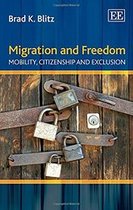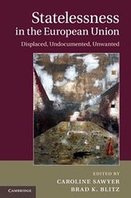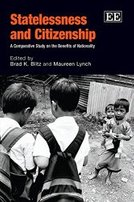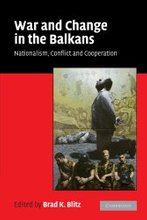Photo: Greg Constantine
Brad Blitz
Books
Migration and Freedom is a thorough and revealing exploration of the complex relationship between mobility and citizenship in Europe. Brad Blitz draws upon European and international law, political theory, economics, history and contemporary studies of migration to provide an original account of the opportunities and challenges associated with the right to free movement in Europe and beyond. Integrating over 160 interviews with individuals in Croatia, Slovenia, Italy, Spain, the UK and Russia, this book provides a unique focus on both internal and inter-state mobility and a reevaluation of the concept of freedom of movement. The author documents successful and unsuccessful settlement and establishment cases and records how both official and informal restrictions on individuals' mobility have effectively created new categories of citizenship and exclusion within Europe. This book is an original study aimed at academics, students and government officials interested in migration, international studies, public and social policy and politics.
'In this timely and important book, Professor Brad K. Blitz, a leading expert on post-conflict integration, statelessness, migration, development and human rights, reminds us how the concept of freedom of movement, and its relationship to migration, has received little comprehensive treatment among academics, even though it underpins what we expect as individuals living in liberal states. This is a tour de force. A work of remarkable scholarship, prescience, and practical relevance, which deserves to be read by all on this much-neglected subject of freedom of movement.'
Satvinder Juss, King s College London, UK
Statelessness in the European Union draws together original research from over one hundred interviews in Estonia, France, Slovenia and the United Kingdom to provide one of the first comparative accounts of the de facto or de jure stateless populations in the European Union. It blends legal, political and empirical research to examine how non-citizens without secure status, in some cases established undocumented migrants and their descendants, manage their lives in four European Union member states. Normative and legal analyses of the practical meaning of basic human rights are combined with a groundbreaking investigation of the obstacles that prevent people from accessing essential services. Contrasting the situation of Europe's stateless now with that examined by Arendt over fifty years ago, it considers proposals for the future security of Europe's stateless people.
'… provide[s] an excellent discussion of statelessness under international law.'
Netherlands International Law Review
The United Nations High Commissioner for Refugees estimates that there are more than 12 million stateless people in the world. The existence of stateless populations challenges some central tenets of international law and contemporary human rights discourses, yet only a very small number of states have made measurable progress in helping individuals acquire or regain citizenship. This fascinating study examines positive developments in eight countries and pinpoints the benefits of citizenship now enjoyed by formerly stateless persons. The expert contributors present an original comparative study that draws upon legal and political analysis as well as empirical research (incorporating over 120 interviews conducted in eight countries), and features the documentary photography of Greg Constantine.This highly original and thought-provoking book will strongly appeal to a wide-ranging audience including academics, researchers, students, human rights activists and government officials with an interest in a diverse range of fields encompassing law, international studies, public policy, human rights and citizenship.
'In our supposedly borderless world, having a nationality, and thus access to documents which permit travel and proof of identity, has become increasingly important. In many parts of the world, including the cases in Europe, Africa and Asia covered in this collection, large groups of people struggle with forms of de facto or de jure statelessness. In addition to providing a conceptual framework derived from international human rights norms for understanding better the phenomenon of statelessness, this collection presents important empirical research material helping us to understand, from the ground up, how statelessness is experienced.'
Jo Shaw, University of Edinburgh, UK
The violence following the break-up of the former Yugoslavia has lasted for more than a decade and continues to mark the region. This 2006 volume analyses the causes of the conflict and describes its course from the onset of war in Croatia to intervention in Kosovo. The book concentrates on four key transformations: the demise of Yugoslavia and the creation of new states; the importance of nationalist ideologies in the preparation of war and their subsequent decline in the post conflict era; the role of international actors as policy makers, implementing agencies, and arbiters; and the process of democratization and integration into European structures. With contributions from some of the world's leading scholars of the Balkans and personal accounts from journalists, diplomats, and civil servants drawing upon their own experiences of war and transition, War and Change in the Balkans provides an unparalleled insight into contemporary European history.
'An impressive collection of essays that provides valuable insight into the forces of change that have buffeted the former Yugoslavia since the end of the Cold War. Blitz has brought together in a single volume some of the world's leading scholars, journalists and diplomats to produce an excellent guide to this troubled region.'
Dr Richard Caplan, University of Oxford
Copyright Brad K. Blitz © All Rights Reserved




